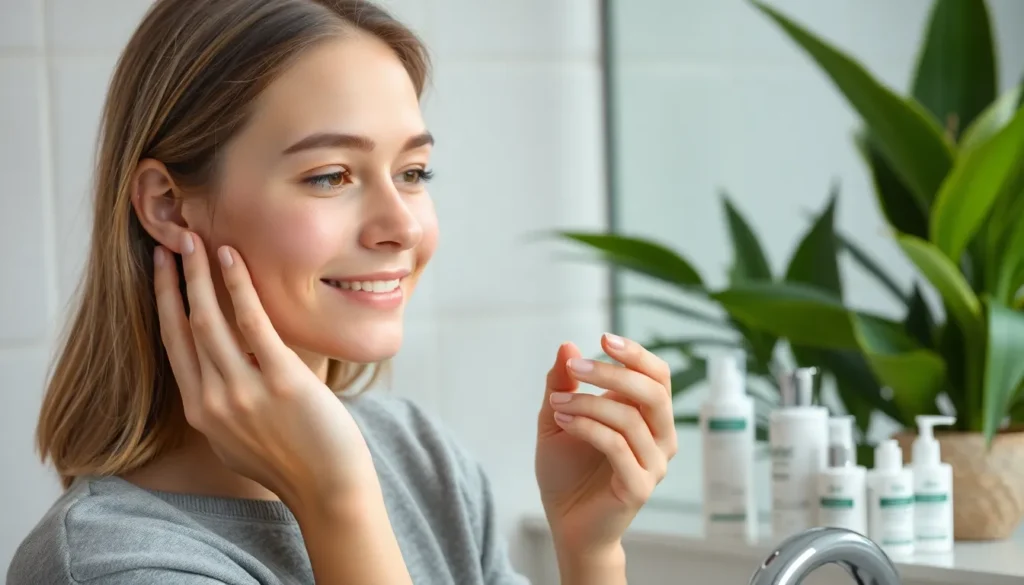Struggling with sensitive acne-prone skin can feel like walking a tightrope between clearing breakouts and avoiding irritation. We’ve all been there – desperately searching for products that won’t trigger redness or burning while still effectively targeting those stubborn blemishes.
The truth is most acne treatments are designed for resilient skin types leaving those with sensitive complexions feeling frustrated and defeated. We understand the unique challenges you face when your skin reacts to seemingly everything yet continues breaking out even though your best efforts.
That’s why we’ve compiled the most effective gentle skincare strategies that actually work for sensitive acne-prone skin. Our approach focuses on building a routine that soothes inflammation while preventing future breakouts – no harsh chemicals or aggressive treatments required. You’ll discover how to achieve clear healthy skin without compromising your skin’s delicate barrier.
Understanding Sensitive Acne-Prone Skin and Its Unique Challenges
When we’re dealing with both sensitivity and acne, our skin presents a complex puzzle that requires careful attention. This dual condition creates a delicate balancing act between treating breakouts and protecting our skin’s vulnerable barrier.
Identifying the Signs of Sensitive Acne-Prone Skin
Redness appears frequently around breakouts and extends beyond the affected areas, creating a flushed appearance that persists even after acne clears. We often notice this inflammation spreads to surrounding healthy skin, making our complexion appear irritated rather than just blemished.
Burning sensations occur when we apply common acne treatments like benzoyl peroxide or salicylic acid that work well for others. Our skin reacts immediately with stinging, tingling, or uncomfortable heat that signals these products are too harsh for our particular skin type.
Dryness develops alongside oiliness in different areas of our face, creating combination skin that feels tight in some spots while remaining greasy in others. This paradoxical condition makes it challenging to choose products that address both concerns without worsening either issue.
Breakouts worsen after using products specifically designed for acne treatment, indicating our skin can’t tolerate standard concentrations of active ingredients. We experience increased inflammation, more pustules, or deeper cystic acne when using conventional acne medications.
Reactions happen quickly to new skincare products, fragrances, or environmental factors, with symptoms appearing within hours rather than days. Our skin shows immediate signs of distress through increased redness, itching, or breakout activity.
Common Triggers That Worsen Both Sensitivity and Breakouts
Harsh cleansing agents like sulfates strip our skin’s natural oils while simultaneously triggering inflammatory responses that lead to more acne. Sodium lauryl sulfate and sodium laureth sulfate create microscopic tears in our skin barrier, allowing bacteria to penetrate deeper and cause more severe breakouts.
Fragrance ingredients irritate sensitive skin while clogging pores through synthetic compounds that our skin can’t process effectively. Essential oils, parfum, and aromatic extracts cause contact dermatitis that manifests as both immediate redness and delayed acne formation.
Over exfoliation damages our protective barrier through mechanical scrubs or excessive chemical exfoliant use, leading to increased oil production and bacterial overgrowth. Physical scrubs with walnut shells or apricot kernels create micro tears, while daily use of glycolic acid or retinoids overwhelms our skin’s repair mechanisms.
Environmental stressors including pollution, extreme temperatures, and UV exposure trigger inflammatory cascades that worsen both conditions simultaneously. Particulate matter from air pollution clogs pores while oxidative stress increases skin sensitivity and compromises our natural healing processes.
Hormonal fluctuations intensify both acne formation and skin sensitivity through increased androgen production and compromised barrier function. Monthly cycles, stress hormones like cortisol, and dietary influences create perfect storms where our skin becomes more reactive while producing excess sebum.
Product layering overwhelms sensitive acne prone skin when we use multiple active ingredients or apply too many products in sequence. Combining retinoids with alpha hydroxy acids or using vitamin C serums with benzoyl peroxide creates chemical reactions that irritate sensitive skin while potentially reducing acne fighting effectiveness.
Gentle Cleansing: The Foundation of Skincare for Sensitive Acne Prone Skin
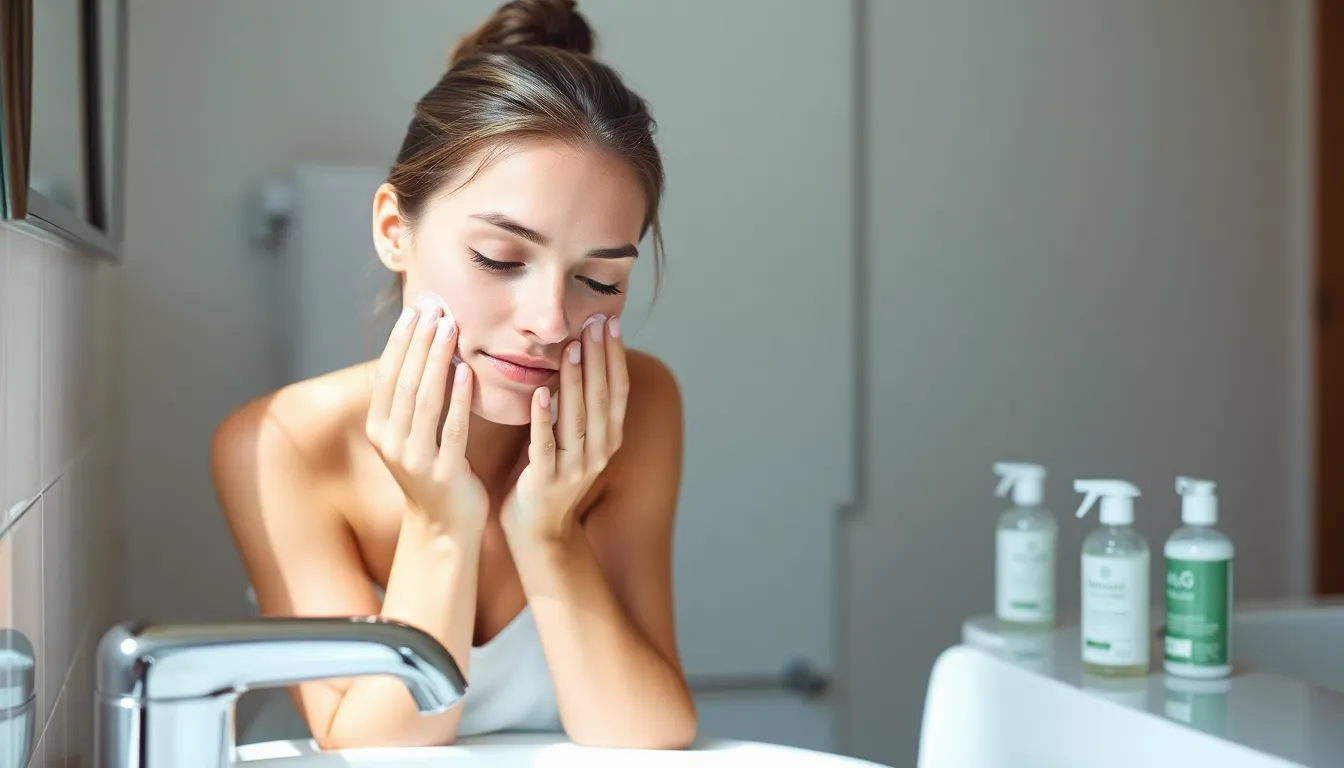
Gentle cleansing forms the cornerstone of effective skincare for sensitive, acne prone complexions. This foundational approach maintains our skin barrier while preventing irritation and reducing the risk of worsening breakouts.
Choosing Low-pH, Non-Stripping Cleansers
Low-pH cleansers with a range of 4-6 work best for sensitive skin types because they’re less likely to disrupt our natural barrier compared to harsh, high-pH soaps. Non-stripping formulations become essential since they avoid irritating ingredients like sulfates and alcohol, which can increase transepidermal water loss and worsen sensitivity.
Antibacterial face washes may benefit mild acne but can irritate sensitive skin when used excessively or with strong active ingredients. Natural, non-toxic ingredients are gaining popularity in acne prone sensitive skincare, including mild surfactants, fruit derived acids, and botanical extracts that cleanse without compromising our delicate skin barrier.
Products containing these gentle formulations help us maintain the delicate balance between treating acne and protecting sensitive skin from further irritation.
Proper Cleansing Techniques to Avoid Irritation
Washing no more than twice daily prevents over-cleansing and irritation since excessive washing can compromise our skin barrier and worsen sensitivity. Using lukewarm water only protects our skin because hot water strips natural oils and aggravates sensitive complexions.
Patting skin dry gently with a clean towel becomes crucial to avoid rubbing, which can worsen both acne and sensitivity. Applying cleanser with clean hands using circular, gentle motions works better than abrasive scrubs or exfoliating brushes that can damage our compromised skin barrier.
Following cleansing with a non-comedogenic, hydrating moisturizer formulated for sensitive, acne prone skin maintains proper hydration and barrier function. Clinical studies show that combined treatment strategies including gentle cleansing and appropriate moisturization result in better outcomes compared to treating acne alone, making this comprehensive approach essential for our skincare success.
Incorporating Mild Exfoliation Without Causing Inflammation
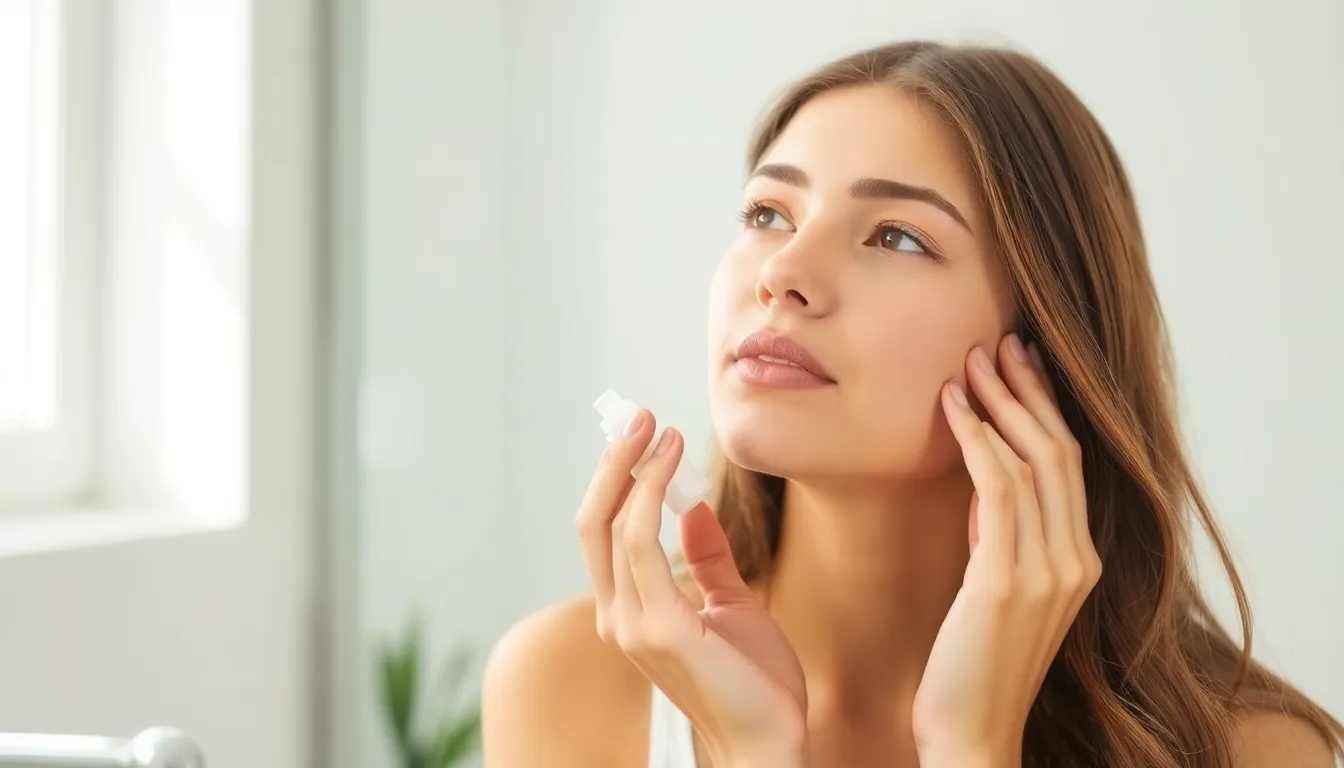
Adding exfoliation to your sensitive acne-prone skincare routine requires a delicate balance to remove dead skin cells without triggering irritation. Over-exfoliation can increase transepidermal water loss (TEWL) and reduce skin hydration, leading to worse sensitivity and potential flare-ups.
BHA vs AHA: Which Works Better for Sensitive Skin
BHA (Beta Hydroxy Acid) penetrates deep into pores because it’s oil-soluble, making it particularly effective for acne-prone skin. Salicylic acid, the most common BHA, offers anti-inflammatory properties that help sensitive skin tolerate the exfoliation process better. Clinical observations show that BHA’s ability to work inside follicles makes it ideal for preventing clogged pores without excessive surface irritation.
AHA (Alpha Hydroxy Acids) work on the skin’s surface as water-soluble exfoliants, improving texture and boosting hydration levels. Glycolic and lactic acids derived from natural sources can be surprisingly gentle for sensitive skin when formulated in appropriate concentrations. Studies indicate that combining acne treatment with sensitive skin care yields better results, as AHAs help normalize the thinner epidermis and increased TEWL commonly seen in sensitive skin.
Both acid types can benefit sensitive acne-prone skin, but concentration and formulation quality matter more than the exact acid chosen. We recommend starting with lower concentrations and monitoring your skin’s response before increasing strength.
Frequency and Application Tips for Gentle Exfoliation
Start slowly with exfoliation once or twice weekly to assess your skin’s tolerance level. Rushing into daily use often leads to irritation that sets back your skincare progress for weeks.
Choose low concentration formulas specifically designed for sensitive skin rather than standard strength products. Products formulated with soothing ingredients help reduce redness and inflammation during the exfoliation process.
Apply on clean, dry skin followed immediately by a moisturizer that supports hydration and barrier repair. This application method maximizes effectiveness while minimizing potential irritation.
Avoid combining exfoliants with harsh cleansers or other potentially irritating treatments in the same routine. Layer products strategically to prevent overwhelming your sensitive skin barrier.
Use sunscreen daily since both AHAs and BHAs increase photosensitivity, making your skin more vulnerable to UV damage. Moisturizers with SPF that include sebum-absorbing and calming ingredients support treatment compliance while reducing irritation risk.
Opt for multi-functional products that offer acne treatment, hydration, and soothing benefits in one formula. Non-comedogenic, fragrance-free formulations reduce your risk of experiencing adverse reactions while maintaining treatment effectiveness.
Selecting Acne-Fighting Ingredients That Won’t Irritate Sensitive Skin
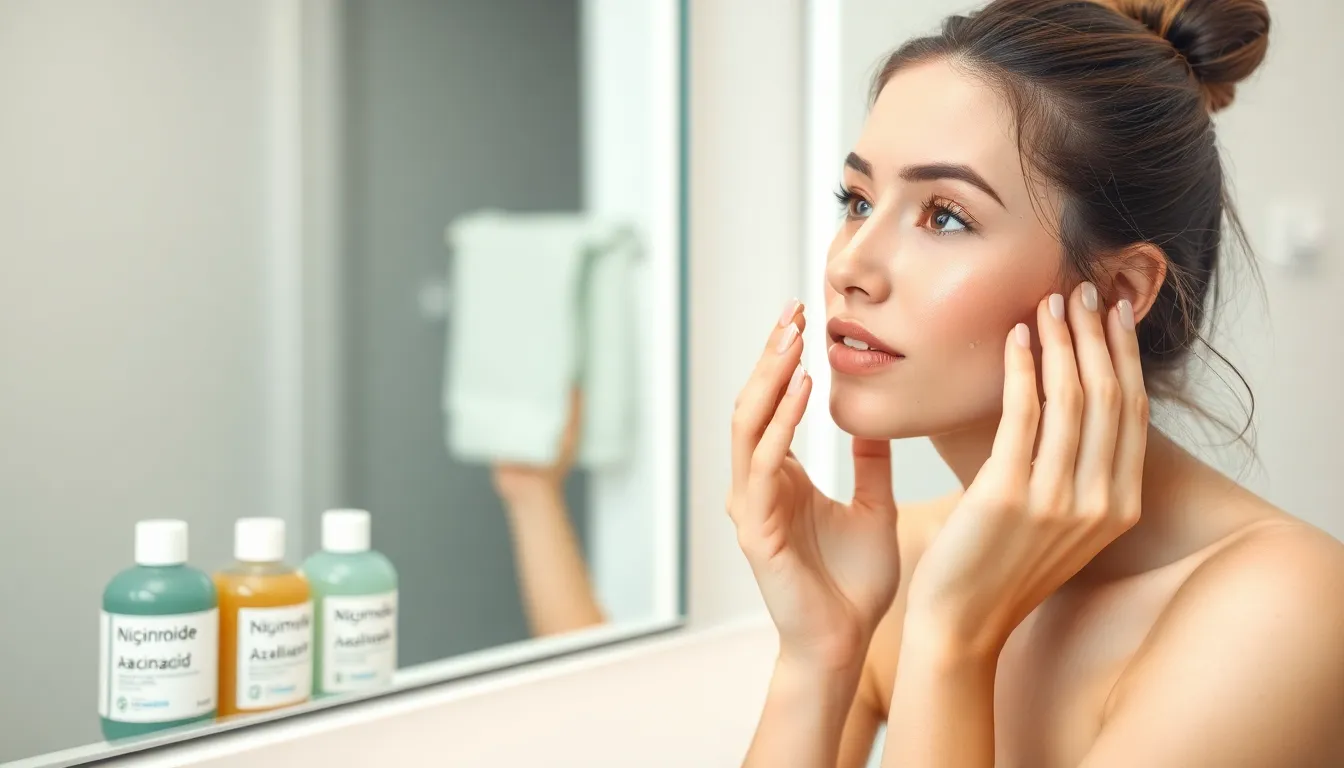
Finding acne treatments that effectively clear breakouts without triggering sensitivity requires careful ingredient selection. We’ll explore gentle alternatives that deliver results while protecting your skin’s delicate barrier.
Benzoyl Peroxide Alternatives for Sensitive Types
Traditional benzoyl peroxide can cause excessive dryness and irritation for sensitive acne-prone skin types. Niacinamide serves as an excellent alternative because it improves skin barrier function and reduces inflammation without harsh side effects. This vitamin B3 derivative regulates oil production while calming existing breakouts.
Azelaic acid offers another powerful yet gentle option for sensitive skin management. Research shows this naturally occurring acid provides antibacterial properties that target acne-causing bacteria while reducing redness and inflammation. Unlike benzoyl peroxide, azelaic acid won’t cause bleaching or excessive peeling that often accompanies traditional acne treatments.
Zinc oxide represents another benzoyl peroxide substitute that’s particularly beneficial for daytime use. This mineral ingredient provides anti-inflammatory benefits while offering sun protection, making it ideal for sensitive acne-prone skin that needs gentle yet effective treatment.
Niacinamide and Azelaic Acid as Gentle Options
Niacinamide concentrations between 2-10% provide optimal results for sensitive acne-prone skin without causing irritation. Studies demonstrate that this ingredient strengthens the skin barrier while regulating sebum production, making it perfect for managing both sensitivity and breakouts simultaneously. We recommend starting with lower concentrations and gradually increasing as your skin builds tolerance.
Azelaic acid works exceptionally well for sensitive skin because it provides multiple benefits in one ingredient. This multifunctional acid reduces acne-causing bacteria, minimizes post-inflammatory hyperpigmentation, and soothes inflammation without the harsh effects of stronger treatments. Concentrations of 10-20% prove most effective for acne management while remaining gentle enough for daily use.
Both ingredients can be safely combined in your routine, though we suggest introducing them gradually. Morning application of niacinamide followed by evening azelaic acid use allows your skin to benefit from both ingredients without overwhelming your sensitive barrier. These gentle alternatives align with current market trends favoring natural, multi-functional products that provide hydration, sun protection, and calming benefits for sensitive acne-prone skin.
Moisturizing Strategies for Balancing Hydration and Oil Control

Finding the right moisturizer for sensitive acne prone skin requires balancing hydration needs with oil control to prevent breakouts while maintaining skin health.
Lightweight, Non-Comedogenic Moisturizer Options
Choosing products labeled “non-comedogenic” or “oil-free” minimizes pore blockage risk. These formulations prevent clogged pores while delivering essential hydration to sensitive skin. Products containing hyaluronic acid retain moisture without adding excess oil, making them ideal for acne prone complexions. Glycerin based moisturizers provide gentle hydration that won’t irritate sensitive skin barriers.
Water based formulas offer optimal hydration without greasiness. Gel moisturizers absorb quickly into skin without leaving heavy residues that could trigger breakouts. Ceramide enriched products strengthen skin barriers while maintaining lightweight textures. Squalane derived moisturizers provide non-comedogenic hydration that mimics skin’s natural oils.
SPF containing moisturizers serve dual purposes for sensitive acne prone skin. Over 85% of patients reported better acne treatment tolerance when using moisturizers with SPF 30 protection. Mineral sunscreen ingredients like zinc oxide provide anti-inflammatory benefits alongside sun protection. Combination products reduce skincare steps while maintaining effective protection.
The Importance of Maintaining Skin Barrier Function
Maintaining skin barrier integrity prevents moisture loss and irritation in sensitive acne prone skin. Conditions like increased transepidermal water loss (TEWL) and decreased hydration commonly affect sensitive complexions. Products that strip natural oils compromise barrier function and worsen both sensitivity and acne. Gentle formulations preserve protective lipid layers while addressing breakout concerns.
Combined treatments addressing both acne and sensitivity show superior outcomes. Studies demonstrate better lesion reduction and improved skin health when treatments protect barrier function. Moisturizers with barrier repair ingredients like niacinamide strengthen skin while preventing irritation. Avoiding harsh ingredients preserves natural protective mechanisms essential for sensitive skin.
Regular moisturizing supports acne treatment effectiveness and reduces side effects. Well hydrated skin tolerates active ingredients better than compromised barriers. Consistent barrier maintenance prevents the dryness that often accompanies acne treatments. Proper hydration helps skin recover from breakouts while preventing future sensitivity issues.
Sun Protection Essentials for Sensitive Acne-Prone Skin Types

Daily sun protection becomes critical when managing sensitive acne prone skin, as UV exposure can worsen inflammation and interfere with healing. Moisturizers containing SPF 30 help improve tolerance to acne treatments while providing essential protection, often including sebum absorbing ingredients that benefit oily areas without drying non-oily skin.
Mineral vs Chemical Sunscreens for Reactive Skin
Mineral sunscreens create a physical barrier on the skin’s surface using zinc oxide or titanium dioxide, making them generally less irritating and more suitable for sensitive skin types. These formulations sit on top of the skin rather than penetrating deeper layers, reducing the risk of adverse reactions that sensitive acne prone skin often experiences.
Chemical sunscreens work differently by absorbing UV rays and converting them into heat, which can trigger irritation in reactive skin types compared to their mineral counterparts. Heat generation from chemical filters may also stimulate oil production and inflammation, potentially worsening acne breakouts in already compromised skin.
Zinc oxide offers dual benefits for sensitive acne prone skin by providing broad spectrum protection while delivering anti-inflammatory properties that help calm existing breakouts. Titanium dioxide complements zinc oxide in mineral formulations, creating comprehensive UV defense without the sensitizing potential of chemical alternatives.
Finding Non-Pore-Clogging SPF Formulations
Non-comedogenic labeling indicates products are specifically formulated to avoid clogging pores, making them essential for acne prone skin that’s already struggling with congestion. We recommend prioritizing lightweight formulations that feel comfortable for daily use without contributing to the heavy, greasy sensation that can worsen breakouts.
| SPF Feature | Benefit for Sensitive Acne-Prone Skin |
|---|---|
| SPF 30 minimum | Adequate protection while improving treatment tolerance |
| Non-comedogenic formula | Prevents pore clogging and new breakout formation |
| Lightweight texture | Comfortable daily wear without heaviness |
| Sebum-absorbing ingredients | Controls oil in T-zone while hydrating dry areas |
Gel based and water based sunscreen formulations absorb quickly into sensitive acne prone skin without leaving residue that could trap bacteria or irritants. These textures work particularly well under makeup or other skincare products, maintaining the delicate balance between protection and breathability that reactive skin requires.
Ingredients like niacinamide in SPF products provide additional benefits by strengthening the skin barrier while offering sun protection, creating multi-functional answers that minimize the number of products needed in sensitive routines. Avoiding fragrances, alcohol, and other common irritants in sunscreen formulations helps prevent the stinging and burning sensations that plague sensitive acne prone skin types.
Building a Complete Skincare Routine Step-by-Step
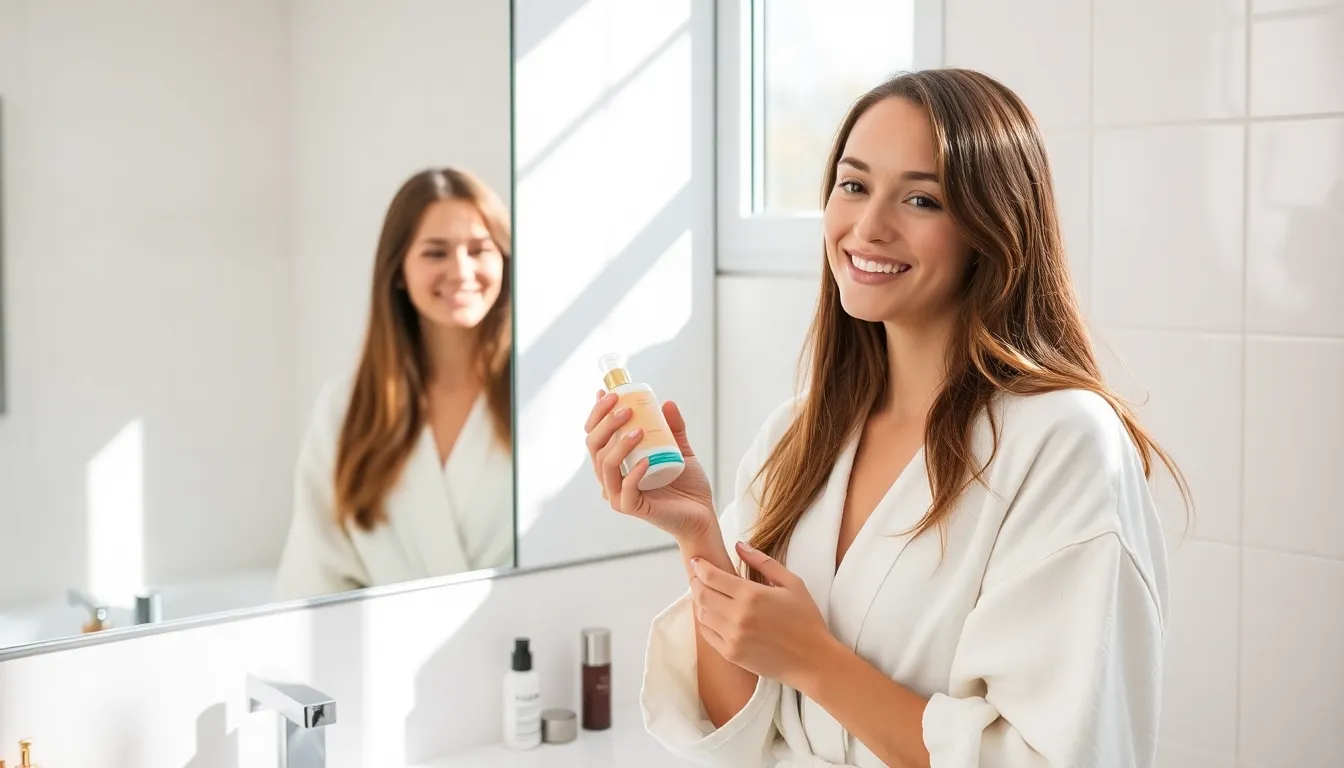
Creating an effective routine requires strategic layering of products that work harmoniously with sensitive acne prone skin. We’ll establish consistent morning and evening protocols that address breakouts while maintaining skin barrier integrity.
Morning Routine for Sensitive Acne-Prone Skin
Cleanse with a mild, hydrating cleanser containing aloe vera or niacinamide for anti-inflammatory benefits. Gentle formulations protect sensitive skin from harsh ingredients that can trigger irritation and compromise the skin barrier.
Apply a hydrating mist instead of traditional alcohol-based toners to avoid stripping natural oils. Tonic formulas with natural antioxidants like lotus extract help protect against free radicals while maintaining moisture balance.
Moisturize using an oil-free, lightweight moisturizer specifically formulated for acne prone skin. Look for calming ingredients like aloe or niacinamide that prevent irritation while providing essential hydration without clogging pores.
Protect with SPF as the final step to shield skin from UV damage that can worsen inflammation. Non-comedogenic mineral sunscreens offer dual benefits of sun protection and anti-inflammatory properties for sensitive complexions.
Evening Routine Modifications and Treatment Applications
Start with the same gentle cleansing approach used in the morning to remove impurities without over-stripping skin. Maintain consistency in your cleansing routine to avoid confusing sensitive skin with varying product formulations.
Target exact concerns with leave-on acne treatments containing niacinamide instead of benzoyl peroxide-based cleansers. This approach allows for consistent treatment delivery while minimizing irritation risks associated with harsh wash-off products.
Layer treatments strategically by applying acne medications or spot treatments after cleansing but before moisturizing. Niacinamide treatments help balance oil production, soothe redness, and improve overall skin tone when applied to clean skin.
Finish with your lightweight moisturizer to seal in treatments and maintain hydration overnight. Evening routines allow for stronger concentrations of active ingredients since skin repairs itself during sleep cycles.
Adjust treatment frequency based on skin sensitivity levels and exact breakout patterns. Start with every other night application of active treatments to build tolerance before increasing to daily use.
Common Mistakes to Avoid When Treating Sensitive Acne-Prone Skin
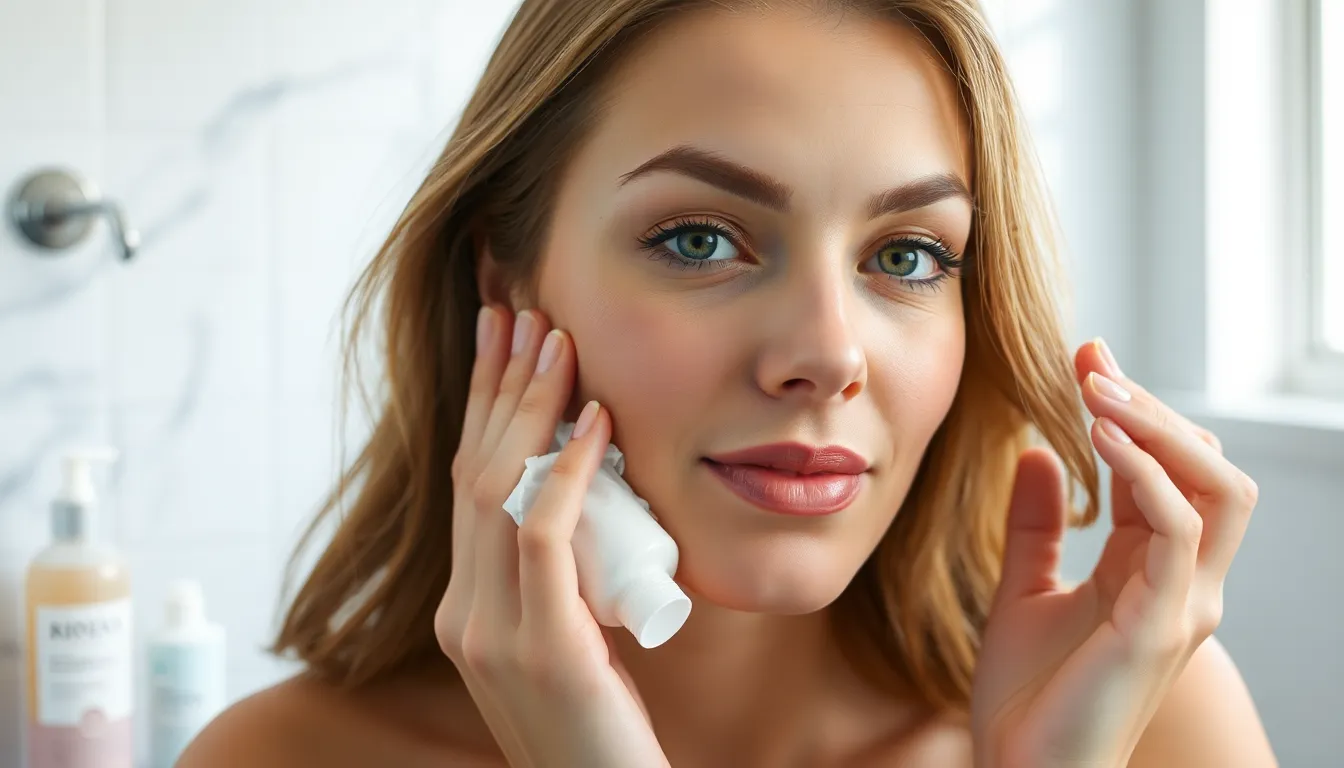
Even with the gentlest intentions, we often make critical errors that can sabotage our skincare progress. Understanding these common pitfalls helps us protect our delicate skin barrier while effectively managing breakouts.
Over-Cleansing and Product Layering Errors
Washing your face too frequently strips natural oils and disrupts the skin barrier, leading to increased irritation and inflammation. We recommend using a mild, hydrating cleanser no more than twice daily to maintain optimal skin health. Research shows that over-cleansing creates a cycle where the skin overproduces oil to compensate for what’s been stripped away.
Harsh cleansers containing sulfates or alcohol-based formulas cause redness and micro-tears that worsen sensitivity. Physical scrubs create additional damage by causing microscopic wounds that can harbor bacteria. Instead, we should choose gentle, pH-balanced cleansers that remove impurities without compromising the protective barrier.
Applying multiple acne treatments simultaneously overwhelms sensitive skin and triggers adverse reactions. Layering several active ingredients like benzoyl peroxide, salicylic acid, and retinoids in one routine creates excessive dryness and irritation. We must introduce products gradually, allowing our skin to adjust to each new treatment before adding another.
Product layering errors occur when we rush the process instead of building tolerance slowly. Starting with multiple actives creates inflammation that can take weeks to heal. We should focus on one primary active ingredient at a time, monitoring our skin’s response before expanding our routine.
Ingredient Combinations That Can Cause Reactions
Benzoyl peroxide combined with retinoids or high-strength salicylic acid causes excessive dryness and barrier damage in sensitive skin types. These powerful ingredients work differently but can create cumulative irritation when used together. We recommend using benzoyl peroxide in the morning and retinoids at night, or choosing lower concentrations of each.
Multiple acids in one routine increase the risk of chemical burns and long-term barrier dysfunction. Combining salicylic acid, glycolic acid, and retinoids creates pH imbalances that compromise skin health. We should select one primary exfoliating acid and use it consistently before considering additional treatments.
Fragrances and essential oils provoke allergic reactions in up to 30% of people with sensitive, acne-prone skin. These additives serve no therapeutic purpose and often contain compounds that trigger inflammation. We must choose fragrance-free, non-comedogenic formulas to minimize reaction risks.
| Problematic Combination | Risk Level | Recommended Alternative |
|---|---|---|
| Benzoyl peroxide + retinoids | High | Use at different times or lower strengths |
| Multiple acids together | Very High | Choose one acid at a time |
| Fragrances + active ingredients | Moderate | Opt for fragrance-free formulas |
| Alcohol toners + exfoliants | High | Skip alcohol-based products entirely |
Sulfates combined with active treatments create a perfect storm for irritation and breakouts. These harsh detergents strip the skin while actives penetrate deeper, causing burning and redness. We should avoid sulfate-containing cleansers when using any acne treatments to prevent compounding irritation effects.
Professional Treatment Options and When to Seek Help

Sometimes our gentle at-home routine reaches its limits, and professional intervention becomes necessary for optimal skin health.
Dermatologist-Recommended Treatments for Sensitive Skin
Starting with proven gentle options forms the foundation of professional acne treatment. Low-strength benzoyl peroxide (2.5-5%) offers antiseptic properties that reduce skin bacteria while decreasing whiteheads and blackheads with anti-inflammatory benefits. Adapalene, a topical retinoid, helps unclog pores and reduces inflammation while being generally well-tolerated for sensitive skin types.
Beginning with products specifically labeled for sensitive use prevents unnecessary irritation. We recommend applying treatments sparingly and gradually increasing frequency as your skin adapts to the active ingredients. Dermatologists often suggest starting with every other night application before progressing to daily use.
Combining treatments can enhance results when done under professional guidance. Pairing benzoyl peroxide with adapalene may provide superior acne control, though this combination requires careful monitoring to minimize irritation potential. Your dermatologist might also recommend topical antibiotics, azelaic acid, or low-concentration salicylic acid face washes for comprehensive treatment.
Addressing hormonal factors often requires specialized treatments. For hormonal acne patterns, dermatologists may prescribe oral contraceptives or spironolactone to regulate underlying hormonal triggers that contribute to persistent breakouts.
Professional procedures offer additional treatment options. Light therapy, chemical peels designed for sensitive skin, and other in-office treatments can complement topical regimens when performed by qualified professionals.
Signs It’s Time to Consult a Skincare Professional
Persistent acne that doesn’t improve after 6-8 weeks of consistent over-the-counter treatment indicates professional help is needed. This timeframe allows adequate opportunity for gentle treatments to show effectiveness without prolonging ineffective approaches.
Severe inflammatory acne requires immediate professional attention. Nodules, cysts, or deep painful breakouts can lead to permanent scarring if not treated promptly with prescription medications and professional monitoring.
Important skin irritation from products signals the need for expert guidance. Burning, excessive redness, or worsening sensitivity suggests your current routine needs professional evaluation and modification.
Scarring development demands professional intervention. Early treatment of scarring potential prevents permanent textural changes and discoloration that become more difficult to address over time.
Emotional distress or daily life impact justifies professional consultation. When acne affects your confidence, social interactions, or mental well-being, seeking professional help ensures comprehensive care that addresses both physical and emotional aspects of skin concerns.
Uncertainty about product combinations or side effects warrants professional advice. Dermatologists can create customized skincare routines that maximize efficacy while minimizing adverse reactions for your exact skin type and sensitivity level.
Conclusion
Managing sensitive acne-prone skin doesn’t have to be an uphill battle. We’ve shown you that with the right approach—gentle cleansing non-comedogenic moisturizers and carefully selected active ingredients—you can achieve clearer healthier skin without the irritation.
Remember that consistency trumps intensity every time. Start slowly introduce one new product at a time and listen to your skin’s responses. Whether you’re using niacinamide for barrier support or mineral sunscreen for daily protection the key is patience and persistence.
Your skin’s sensitivity isn’t a limitation—it’s simply a guide for making smarter choices. By following these evidence-based strategies and knowing when to seek professional help you’re well-equipped to create a routine that works harmoniously with your skin’s unique needs.
Frequently Asked Questions
What makes skin both sensitive and acne-prone?
Sensitive acne-prone skin occurs when the skin barrier is compromised, leading to increased reactivity while still producing excess oil and experiencing breakouts. This combination creates unique challenges, as traditional acne treatments often irritate sensitive skin, while gentle products may not effectively address acne concerns.
How can I tell if I have sensitive acne-prone skin?
Key signs include persistent redness, burning sensations from common acne treatments, paradoxical dryness alongside oiliness, and skin that reacts negatively to fragrances or harsh ingredients. You may also experience increased irritation from over-exfoliation or environmental stressors while still dealing with regular breakouts.
What cleansing routine works best for sensitive acne-prone skin?
Use a low-pH, non-stripping cleanser twice daily with lukewarm water. Gently massage for 30 seconds, then pat dry with a clean towel. Avoid over-cleansing, which can strip natural oils and worsen sensitivity. Follow immediately with a non-comedogenic, hydrating moisturizer to maintain barrier function.
Which exfoliating acids are gentlest for sensitive acne-prone skin?
BHA (salicylic acid) is typically best for acne-prone skin due to its anti-inflammatory properties and ability to penetrate pores. Start with 0.5-1% concentration. AHA can also work for surface exfoliation but may be more irritating. Always introduce acids slowly and use sunscreen daily.
What acne-fighting ingredients won’t irritate sensitive skin?
Niacinamide (2-10%), azelaic acid (10-20%), and zinc oxide are excellent gentle alternatives to harsh treatments. These ingredients provide anti-inflammatory benefits, reduce breakouts, and support skin barrier function without the irritation associated with benzoyl peroxide or strong retinoids.
How should I moisturize sensitive acne-prone skin?
Choose lightweight, non-comedogenic moisturizers with hyaluronic acid, glycerin, or niacinamide. Water-based or gel formulations absorb quickly without greasiness. Focus on barrier repair ingredients to prevent moisture loss while avoiding heavy oils that might clog pores.
What type of sunscreen is best for sensitive acne-prone skin?
Mineral sunscreens containing zinc oxide or titanium dioxide are ideal because they’re less likely to cause irritation. Look for non-comedogenic, lightweight formulations with at least SPF 30. Some mineral sunscreens also provide anti-inflammatory benefits while protecting against UV damage.
What common mistakes should I avoid with sensitive acne-prone skin?
Avoid over-cleansing (more than twice daily), layering multiple active ingredients, using fragranced products, and combining harsh treatments like benzoyl peroxide with retinoids. Don’t rush to try new products—introduce one at a time and patch test first to prevent adverse reactions.
When should I see a dermatologist for sensitive acne-prone skin?
Consult a professional if acne persists despite consistent routine, you experience severe inflammatory acne, develop scarring, feel emotionally distressed about your skin, or are unsure about product combinations. Professional guidance can help create customized treatments that balance effectiveness with gentleness.
Can I use multiple acne treatments if I have sensitive skin?
It’s best to start with one gentle active ingredient and gradually introduce others under professional guidance. Avoid combining multiple acids or harsh treatments simultaneously, as this can overwhelm sensitive skin. Focus on a simple routine with proven gentle ingredients rather than layering multiple products.

